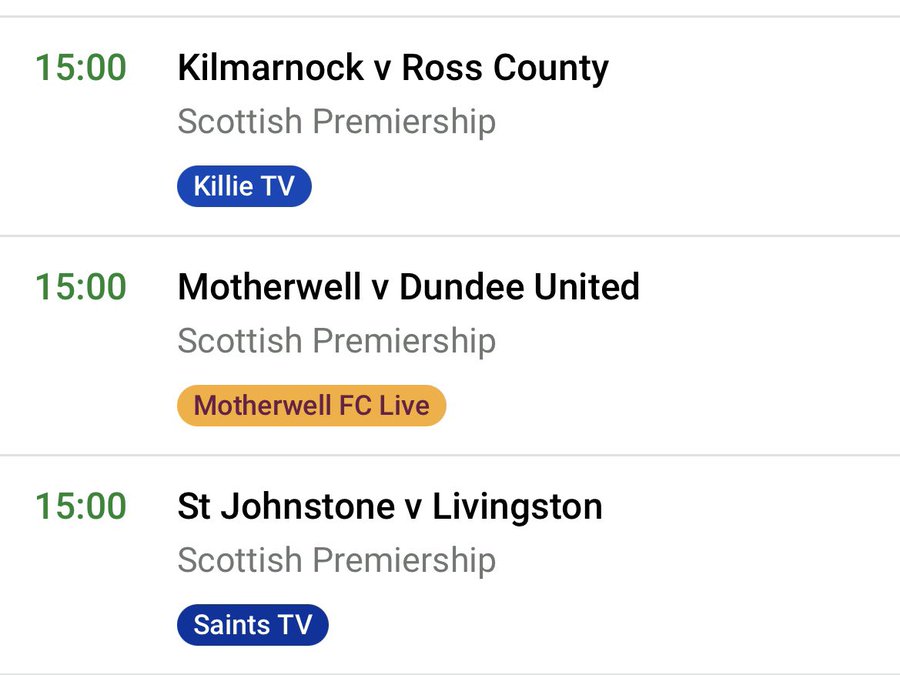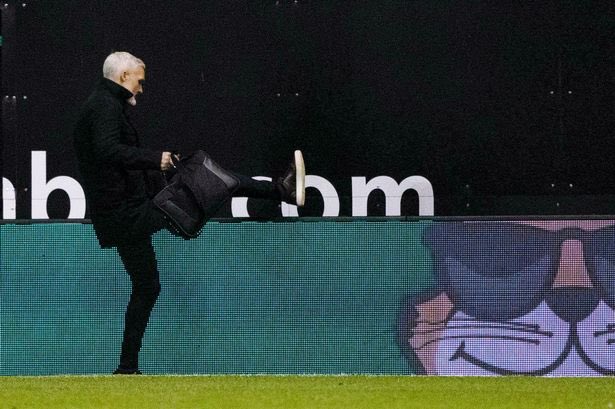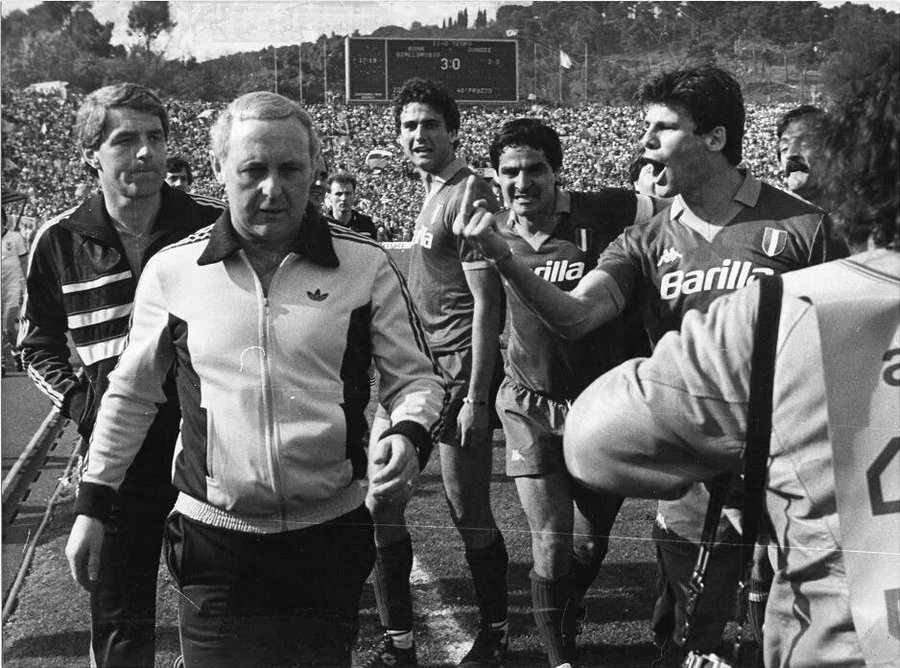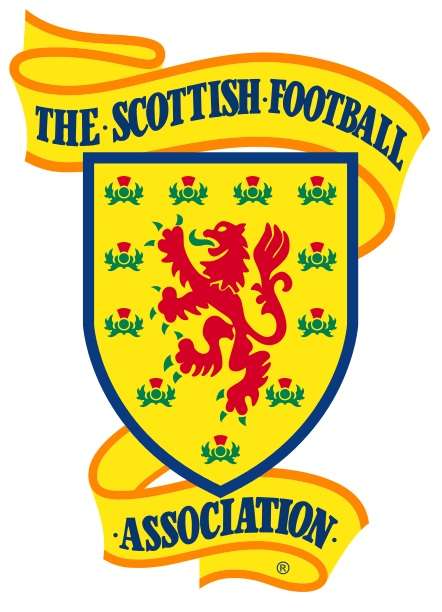Scottish football, the power of loss and who in authority champions our game?
The past weekend was a big one in Scottish and English football and senior leagues. Both contained for many fans matters of near life and death as a host of clubs battled to remain in their top leagues or to face relegation with all the pitfalls that entails.
A normal conclusion to the business end of the season. But there was a major difference between the two nations on football. While the English Premier League saw all the big relegation matches involving Everton, Leeds United and Leicester City on Sky Sports and BT Sport, the same was not true for Scotland and its Premiership.
Despite (or because of) the Sky Sports deal to cover the Scottish game on the Sunday involving three matches in the bottom half of the league, with the fates of Dundee United, Kilmarnock and Ross County in the balance, Sky showed none live. Instead they decided over the weekend to show Saturday’s Celtic versus Aberdeen match at which nothing was at stake, with Celtic having won the league and Aberdeen finishing third.
Such is the predictable lack of imagination and due care with which broadcasters regard the Scottish game, treating teams outside ‘The Old Firm’ and their fans with contempt and seeing them as little more than backdrops for the occasional encounter and defeat from one of the Glasgow two.

This short-sightedness is a major missed opportunity. The Scottish game cannot compete with the grotesque monies of the English Premier, but it still has a fair share of shocks, drama and excitement. This year the small Ayrshire town of Darvel created international news by knocking Aberdeen out of the Scottish Cup; this cost then Aberdeen manager Jim Goodwin his job after a further 6-0 defeat to Hibs with him moving to Dundee United (more on which below). Meanwhile the conclusion of the Championship, the second tier of the league, had all the Premiership does not with a last day of the season title decider between Dundee and Queen’s Park that was won 5-3 by the Dark Blues.
Living with going down again
My team – Dundee United – have just concluded one of the most bizarre, accident-prone and self-destructive seasons in the club’s history. After finishing a very decent fourth the previous season, they started off proudly competing in Europe, played impressively in a 1-0 home victory against Dutch side AZ Alkmaar, before crashing out 7-0 to the team who got to the semi-finals of the tournament (losing to West Ham). This was followed by a 9-0 record home defeat to Celtic which led to Jack Ross being sacked as manager.

Their season involved three managers, brief periods of hope as they battled at the bottom of the league, followed by disappointment. Chaos abounded in how the club was run behind the scenes clearly suggesting that American owner Mark Ogren had no real plan or strategy; Tony Asghar, Ogren’s man on the ground, embodied many of the problems and became a lightning rod for fans who demanded his removal which happened in February 2023.
Meanwhile on the pitch, United’s recruitment was a shambles with major problems in the goalkeeping position, defence and strikers. All these disastrously cost United league points – and ultimately their league place. The January transfer window came and went, and none of these fundamentals were addressed. Tony Watt was bought from Motherwell after a particular purple patch of goalscoring, then inexplicably loaned out to St Mirren. This put an enormous weight on the shoulders of veteran striker Steven Fletcher who, as the season concluded, spoke of the lack of ‘nastiness’ and ‘fight’ in the squad – words echoed by manager Jim Goodwin. But these words masked more fundamental weaknesses which could have been rectified but were not.
United’s relegation was avoidable but a slow air of inevitability hung over the season, although this is true of many relegations after the event. This is the third time that United have gone down in my adult life – 1995 and 2016 being the other two occasions. My overwhelming emotions are of acceptance – and the predictability of all of this, along with getting used to supporting a club that often gets relegated.
When United went down in 1995, it was in the aftermath of Jim McLean’s golden years, after the club won the league and dismissed numerous European giants on their way to making a name for themselves across the continent. Stern disciplinarian McLean was followed by seemingly carefree Croatian Ivan Golac with his reputed ‘smell the flowers’ attitude. In his first season he won United the Scottish Cup which had eluded McLean, but they were relegated the following year. I was shocked, hurt and bewildered, and wrote my first football article for The Scotsman causing a friend to comment (tactfully perhaps): ‘That was a great article on football full of emotion. Maybe you should write less on politics and more on football.’
United came back up after one season which might have been an aberration. Then in 2016 it happened again, this time flagged up by the selling the previous season of our best players including Stuart Armstrong and Gary Mackay-Steven to Celtic. The club, which until then had a good relationship between those in charge and the fans, was then rent asunder by allegations that led to a breach of trust which continued to fester. The second relegation filled me with anger – a sentiment widely felt among United fans.
On this occasion we took four seasons coming back up from the hyper-competitive Championship. And now we have only spent three years in the top league, becoming like so many other teams a ‘yo-yo club’. To add to the mix our rivals Dundee FC won the Championship and hence passed United as they ascend into the senior league. Add as a final twist of irony that United have gone through all this on the 40th anniversary of winning their one league title in 1983.
Life at the bottom – and beyond
This is what football entails for many football fans: disappointment, resignation and acceptance of the slings and arrows of fortune – unless you support one of the big teams. In Scotland only one football team have had a 100% record in the senior league – Celtic – so fans of most clubs know the emotional mix of the above.
But it is not just about Dundee United, there is another club facing much more existential challenges in the Scottish game – Albion Rovers from Coatbridge. Albion have finally left the senior league set-up, losing a two-legged play-off to Edinburgh based Spartans. This, after 120 years of league history and playing at Cliftonhill since 1919.
The golden era of Albion Rovers was a long time ago, probably in the 1920s. But their fate this year was met by a gentle lament that the game was losing part of its history and a club with proud traditions. This is an appropriate response because the football world that is not just about money loves sentimentality and remembrance, but on the other hand the game has to embrace change.
Albion Rovers are the fifth team to lose their league status in the new pyramid set-up, following Brechin City, Berwick Rangers, Cowdenbeath and East Stirling. Some of those clubs were known as historically hapless and regularly finishing bottom of the lowest league. But the game lost something when a club like East Stirling went, and more so with Berwick Rangers, the English based club playing in Scottish football, and Brechin City, with their world famous (in certain circles) hedge around part of Glebe Park.
None of these clubs have yet made it back after leaving senior football. The emotional pain, loss and disorientation for some of their fans and the towns they represent is incalculable. Being part of senior football has a certain status and having that removed is a major moment – one the rest of us and even most of the football world barely spend a second on.
How the game is presented and not presented in media
Many of these rich moments go unnoticed because of how the game is reported on in the media and represented by broadcasters. An exception is the BBC Scotland channel’s A View from the Terrace which combines a genuine love of the game with curiosity about the smaller fish, unsung heroes and inadvertent comedy of elements of the game. This is a breath of fresh air compared to the now predictable patter of Stuart and Tam on radio’s Off the Ball which once dazzled but is now a shade formulaic. A View from the Terrace is fun and authentic, covering the likes of St Cuthbert Wanderers from my home town Kirkcudbright winning the South of Scotland league last year; to the sad decline of Fort William, once the worst team in UK football, who lost their Highland League status last season (and without who the league just seems a lot less romantic!).
At the weekend past BBC Scotland told us of their plans for the forthcoming Scottish Cup Final: a showcase part of the season and a protected game in terms of broadcasting rights. In their wisdom the BBC have decided that if the English FA Cup Final (kick off 3pm) goes to extra time, the Scottish Cup Final (kick off 5.30pm) will start not on the channel it is meant to be on (BBC One Scotland) but instead on the minority audience BBC Scotland channel.
This form of relegation of the Scottish game does make you wonder about BBC Scotland. One of their few claims to the areas of Scottish public life that they say they champion is the Scottish national game, with wall-to-wall coverage. But here they are potentially agreeing to boot one of the season’s biggest matches and occasions from the main TV channel in favour of the English final.
This is what passes for ‘the national broadcaster’. While BBC bashing is something of another national pastime, the bigger picture is the BBC’s lack of care in covering Scottish football with a couple of honourable exceptions – the brilliant work of BBC Alba on a tiny budget in recent years being one.
The men’s national team matches are missing from BBC and STV (the latter of which used to have a long football pedigree with Scotsport). In a climate of falling living standards with people having to make constant financial decisions lots of Scots and lots of young people are being excluded from watching the game – whether it is the price of going to a senior ground or the cost and complexity of platforms and subscription rights to follow live football.
The list of guilty parties is not confined to media, but includes the principal football authorities: the SFA and SPFL. The football commentator Grant Russell said of the two bodies and wider game over the weekend: ‘The whole thing needs outside influences from outside the bubble to come in and revolutionise it.’
And commenting on Sky’s non-showing of those crucial relegation games, he said: ‘It’s easy to blame Sky today. But this is symptomatic of a complete refusal and desire from the SPFL to create a marketable product where a day like today is compelling to a broadcaster.’
This takes me back to why football has such emotional meaning. The third relegation of Dundee United in recent times makes me reflect on my dad, Edwin, and what United meant to him. He saw United with his father through thick and thin, at one point in 1958-59 seeing them play to a crowd of 500 when they were second bottom of the lowest league. He gave me my passion for United and together we saw the rise of the Terrors under Jim McLean, winning the league, two League Cups, and playing and beating the best of Europe.

My dad died in 1993 at the age of just 60 as the Jim McLean era came to a close. For some of us of a certain generation who were there as we thrashed Borussia Mönchengladbach, played Barcelona off the park twice in the 1980s (as well as previously in the 1960s), and hosted a European final at Tannadice, the McLean era lives on and has never ended in our hearts.
We have great memories and stories from those times. This gives football its frisson, its potential for collective and individual joy, and its edge. But ultimately as well as these evocative moments, football and its fans have to live in the present.
Dundee United are another club, amongst many, who have to face up to realities and try to thrive, or at least, survive, in the increasingly harsh world of monetised modern football and the obsession of too many with following the successes and excesses of a few fawned global elite brands.
The problem at the top: the SFA at 150
All of these emotional connections, history and the continued pull of the game make it germane that we ask: who in authority and influence actually champions and looks out for Scottish football?

Behind the continued shortcomings of TV deals, the coverage of Sky Sports, BT Sport, BBC and non-existent coverage on STV, sit the ineptitude of the SFA and SPFL. Too many in football pass the buck about the terrible deal negotiated with Sky worth £30 million a year, or the absence of the men’s national team from free-to-air TV, having given the rights to UEFA, when other choices are available such as England (Channel 4) or Wales (S4C).
The SFA is 150 years old this year – being marked tonight at a parliamentary reception in Holyrood, but it has little in reality to celebrate over its entire history. It has had one constant: being a private member’s club accountable to no one and presiding over a culture of cronyism, small-mindedness and incompetence. One example among many: it took until 1966 to appoint a full-time manager to the Scottish men’s national team.
Will change and reform ever come to the corridors of power of the game? Will Scottish football remain one of the last vestiges of public life removed from transparency and accountability? And will debates about an independent regulator which have seen progress in England ever gain serious traction in Scotland? Could we have our own OffBall worthy of the name? Football is meant to be the ‘people’s game’, but in Scotland the authorities seem to think they can get away with fooling all of the people all of the time.

All true, but the main problem is that Scotland no longer produces great footballers. The last Scottish player who would have got in an England x11 was Gary Mcallister, that’s almost 30 years ago!
I remember going to a football dinner years ago and Billy Bremner was the speaker, the names he rolled off…Jimmy Johnston, Eddie Gray, Dennis Law, Kenny Daglish,……..where have they all gone and why ?
Which English left fullback is better than Andy Robertson?
You are correct that Scotland does not produce so many top quality players since 1990’s. While there are many reasons why this is mthe primary responsibility for this lies with the organisation which is responsible for development of football in Scotland- The SFA – if ever an organisation lived up to its initials it is this organisation!
Despite all the organisational shortfalls and farce of competition the SPFL had become the attendances at domestic league matches per head of population are highest in Europe in Scotland I also believe SPFL attendances were at a 20 year high this season. Love for the game at all levels remains deep rooted in Scotland despite the self interested donkeys who purport to lead the game.
Absolute bullshit. Scotland just beat Spain. If , Kieran Tierney, John McGinn and Callum McGregor were English they’d play
The England XI is your yardstick then. Very sad.
Agree with McGregor and McGinn not so sure about Tierney who hasn’t played much this season.
The comment fom John Learmouth was such a clear demonstration of ‘the cringe’. We must compare ourselves to England and yet at same time we are not worthy in comparison.
Sorry but I’m not comparing us to England it’s just that their our nearest competitors.
Let’s compare us to Argentina or France or even Croatia which has a comparable population to Scotland.
We’re getting better but still have some way to go.
I remember when we were one of the favourites to win the 1978 World Cup……
What about 1974, John Learmouth?
We played the Brazilians (the reigning champs) off the field (in a 0-0) draw, and Bremner missed from 3 feet.
We were the only undefeated team in the whole tournament that year.
But the golden years of the 60’s and 70’s (and early 80’s) will be difficult to regain, because where are the mobs of kids playing fitba’ in the streets? There’s no many Jimmy Johnstone’s out there that i see.
(The streets have been taken over by vehicles, and the kids are in the hoose playing with their gizmos).
But yes, BBC are shite, and so are the SFA.
Football. Diverting the energy, attention and money of the Scottish population since the year dot.
Can we have some articles about basketball and golf too please?
Golf?
Snooker. Scottish snooker has one to the dogs. Why? We need to be told.
I read an article about East Stirlingshire recently; the gist that I got from it was that they’d found their place. I’ll see if I can find it.
I’ve spent the last couple of years going to – mostly – Lowland League and East of Scotland League games. Part of the problem with bigger games is that certain teams are “expected” to win. Their supporters have been conditioned into this view, but this is a fairly recent phenomenon that’s tied into the amount of money available.
Also topical; witness the F.A.’s hypocrisy regarding gambling. Ivan Toney is banned for months for breaking the rules, but bookies sponsor leagues, cups and have their names all over hoardings and players’ shirts.
Shire article; When Saturday Comes, issue431.
Well, the BBC broadcast the exciting finish to the SWPL live:
https://www.bbc.co.uk/sport/football/65665847
I’m not sure that three Glasgow clubs contesting the title every year would be much better than two, but the standard of play in the women’s game is attracting bigger-than-ever crowds. The cup final was a little disappointing for much of the first hour, though, but you have to give credit to defences and goalkeepers.
Glasgow City have been playing for many years. The other two started to field women’s teams when the money and the TV exposure became interesting…
An excellent article Gerry, and thank you for a shout out for my favourite programme (“shout out” showing that I’m, ahem, down with the kids) A View from the Terrace. The focus on the lower leagues is a welcome antidote to the usual crap, and they are genuinely passionate about their football. I hold a secret hope that one day the BBC will realise that it is the natural successor to Off the Ball, which is now very tired and stale (sorry Stuart Cosgrove, who I really like.) If Tam says “totties” (offensive to an East Coast ear) once more, I will put my foot through the radio and send the bill to the BBC. Why on earth though, did they have the last episode of View from the Terrace a week before the league finished? Utterly astonishing. I thought I could see that in the eyes of Craig Telfer when they were saying cheerio. And a final point. Eagerly awaiting the big game tonight (the playoffs have been truly brilliant) I sought out the BBC’s football section. Not a word. Not one word.
Thanks for those comments Derek.
In total agreement with your observations. I thought exactly that as A View from the Terrace concluded as the business end of the season weaved its way to its conclusion: what bright spark at the BBC prematurely called time on one of BBC’s Scotland’s jewels?
“Eagerly awaiting the big game tonight … I sought out the BBC’s football section. Not a word. Not one word.”
Hint: try looking under ‘Scottish Football’
https://www.bbc.co.uk/sport/football/65745879
plus 3 hours live coverage on Sportsound, minute-by-minute online & post match analysis etc….
Oh, I had no idea it was being covered by Radio Scotland. I’m being sarcastic. If I go to the main football page on a supposedly national broadcaster of all the nations and there’s nothing there but English football, I have the right to question it, no? Given it’s importance and the lack of other football, it should have been one of the main stories, no? No, thought not. Keep scrolling until you find your own bit. Spurs fans would have to go to the English football section, would they? Sheesh.